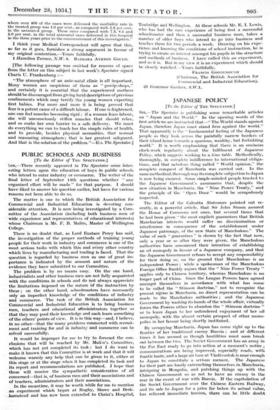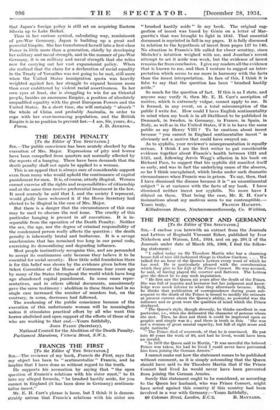JAPANESE POLICY [To the Editor of THE SPECTATOR.] SIR, —The Spectator
is publishing some remarkable articles on " Japan and the World." In the opening words of the first article we are instructed that—" The World stands against Japan, therefore Japan must stand firm against the world." That apparently is the fundamental feeling of the Japanese people as they look across the painfully narrow borders of their island home towards a spacious, wealthy, but forbidding world." It is worth emphasizing that there is an ominous clock-work regularity about the fulfilment of Japanese Policy, which suggests working to a time table. Methodically, thoroughly, in complete indifference to international obliga- tions, and that nebulous thing called " World opinion," the complete conquest of Manchuria was carried out. In the same methodical, thorough way its complete subjection to Japan is now being ensured. Some simple-minded people trusted to the Japanese Government's assurances that, despite the new situation in Manchuria, the " Nine Power Treaty," and the principle of the " Open Door " would be scrupulously
respected. •
The Editor of the Calcutta Statesman pointed out re- cently, in a powerful article, that Sir John Simon assured the House of Commons not once, but several times that he had been given " the most explicit guarantees that British Manchurian interests would suffer no discrimination or interference in consequence of the establishment under Japanese patronage, of the new State of Manchukuo." The value of such guarantees " is shown by the fact that now, only a year or so after they were given, the Manchukuo authorities have announced their intention of establishing an oil monopoly in favour of a Japanese company, and that the Japanese Government refuses to accept any responsibility for their doing so, on the ground that Manchukuo is an independent Power ; while a spokesman of the Manchukuo Foreign Office frankly argues that the " Nine Power Treaty " applies only to Chinese territory, whereas Manchukuo is no longer part of China. Since the League Powers have agreed amongst themselves in accordance with what has come to be called the " Stimson doctrine," not to recognize the present regime in Manchuria, no direct representation can be made to the Manchukuo authorities ; and the Japanese Government by washing its hands of the whole affair, virtually forces the Powers either to abandon the " Stimson doctrine " or to leave Japan to her unhindered enjoyment of her oil monopoly, with the almost certain prospect of other mono- polies in her favour being shortly instituted.
By occupying Manchuria, Japan has come right up to the frontier of her traditional enemy Russia ; and at different times it has seemed as though hostilities must soon break out between the two. The Soviet Government has an army in the Far East ready to go into action at a moment's notice ; communications are being improved, especially roads, with frantic haste, and a large air base at Vladivostok is near enough to Japan to constitute a serious menace. The Japanese for their part are busily entrenching themselves, in Manchuria, intriguing in Mongolia, and patching things up with the Chinese Government so as not to have an enemy in the rear in the event of war with Russia. If the capitulation of the Soviet. Government over the Chinese Eastern Railway, and its sale to Japan for a price far below its actual value, has relieved immediate tension, there can be little doubt
that Japan's foreign policy is still set on acquiring Eastern Siberia up to Lake Baikal.
Thus in her curious cynical, calculating way, reminiscent of pre-War Germany, Japan is building up a great and powerful Empire. She has transformed herself into a first-class Power in little more than a generation, chiefly by developing her military and naval strength, and in the manner of pre-War Germany, it is on military and naval strength that she relies now for carrying out her vast expansionist policy. When she realized that the claim for a declaration of racial equality in the Treaty of Versailles was not going to be met, still more when the United States immigration quota was heavily weighted against her, her struggle to expand became more than ever embittered by violent racial assertiveness. In her own eyes at least, she is struggling to win for an Oriental people, besides an enormous Empire, a position of absolutely unqualified equality with the great European Powers and the United States. In a short time, she will certainly " absorb " the whole of China and probably Australia, in order to cope with her ever-increasing population, and the British Empire is in no position to prevent her.—I am, Sir, yours, &c.,



































 Previous page
Previous page